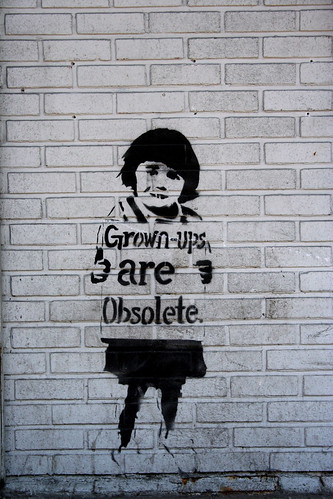Jon Udell notes that WSJ’s landlocked articles may in fact help them drive revenue but at what expense:
“PaidContent.org reminded me that WSJ.com is considered a major success not only in the realm of paid online circulation, but also in comparison to newspapers…This may be a successful model of publishing, but it seems to me a curious definition of success.”
 Photo: niznoz |
How do you measure the opportunity cost of gating your content? The most obvious way is to estimate the number of page views an article would get outside a gated wall and then extrapolate revenue off CPMs.
However, this equation has a fundamental flaw that is not so easy to calculate. It’s the core question of every media company. How do you measure success? Do you exist to make money or do you exist to connect people?
It’s easy to say that media companies have to be both. But which powerpoint slide are you going to show your board of directors first? One of those will ultimately drive every decision at the company.
But even those two metrics fail to measure success in media as I’d like to see it. I’d like to see media brands measuring success based on the quality of the relationships they are able to catalyze. And I don’t see why that’s not possible…it might be hard, but it should be doable.
For example, it’s not how many people read an article that matters, necessarily. It’s how deeply did a story help a person. It’s not how many ad impressions were served, nor is it how many clicks or even the number of sales that result from an ad on a media property. It’s about the types of ways the media property improved the relationship between a vendor and that vendor’s customers.
Imagine how much easier strategic decisions would be if you could look at a report each morning that showed how many of your site visitors were getting promoted in their jobs or referring their friends to particular vendors that advertise on your site.
Imagine going into the board room each quarter and showing that as a direct result of the activity at your web site the average visitor income level increased or productivity in the industry improved or something more substantial like the number of homicides in the area decreased or more people voted in the last election.
 Photo: infomaniac |
Imagine telling an advertiser that working with your media brand meant that their customer retention metrics would improve or that people would be talking about their products more or even that they could drive up shareholder value. Imagine the rates they would pay to work with you for those benefits.
And imagine the types of people that would want to work at this kind of company and the amazing products that would come out of it as a result of these measures of success.
Yeah, pipe dream, I know. At the end of the day, most of us just want to get paid for their work and live a simple life. There’s nothing wrong with that, and I certainly fit in that camp a lot of the time.
The question in my mind is: Are qualitative success metrics like these measurable and attainable? If they’re not, why not? And if they are, why would you pursue anything else?